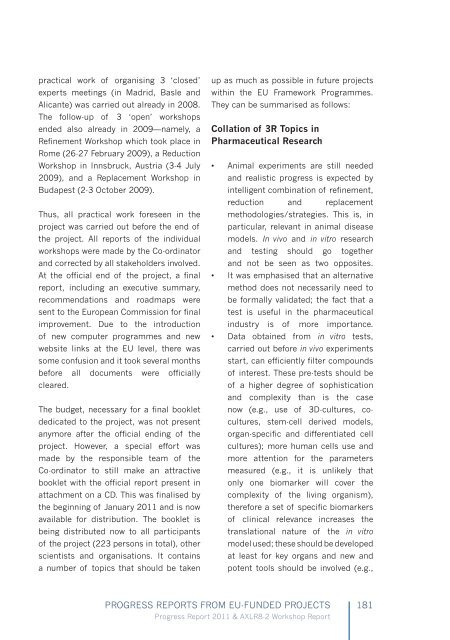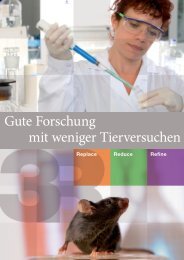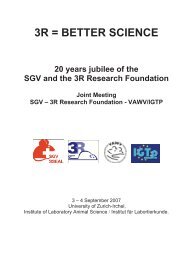Create successful ePaper yourself
Turn your PDF publications into a flip-book with our unique Google optimized e-Paper software.
practical work of organising 3 ‘closed’<br />
experts meetings (in Madrid, Basle and<br />
Alicante) was carried out already in 2008.<br />
The follow-up of 3 ‘open’ workshops<br />
ended also already in 2009—namely, a<br />
Refinement Workshop which took place in<br />
Rome (26-27 February 2009), a Reduction<br />
Workshop in Innsbruck, Austria (3-4 July<br />
2009), and a Replacement Workshop in<br />
Budapest (2-3 October 2009).<br />
Thus, all practical work foreseen in the<br />
project was carried out before the end of<br />
the project. All reports of the individual<br />
workshops were made by the Co-ordinator<br />
and corrected by all stakeholders involved.<br />
At the official end of the project, a final<br />
report, including an executive summary,<br />
recommendations and roadmaps were<br />
sent to the European Commission for final<br />
improvement. Due to the introduction<br />
of new computer programmes and new<br />
website links at the EU level, there was<br />
some confusion and it took several months<br />
before all documents were officially<br />
cleared.<br />
The budget, necessary for a final booklet<br />
dedicated to the project, was not present<br />
anymore after the official ending of the<br />
project. However, a special effort was<br />
made by the responsible team of the<br />
Co-ordinator to still make an attractive<br />
booklet with the official report present in<br />
attachment on a CD. This was finalised by<br />
the beginning of January 2011 and is now<br />
available for distribution. The booklet is<br />
being distributed now to all participants<br />
of the project (223 persons in total), other<br />
scientists and organisations. It contains<br />
a number of topics that should be taken<br />
up as much as possible in future projects<br />
within the EU Framework Programmes.<br />
They can be summarised as follows:<br />
Collation of <strong>3R</strong> Topics in<br />
Pharmaceutical Research<br />
• Animal experiments are still needed<br />
and realistic progress is expected by<br />
intelligent combination of refinement,<br />
reduction and replacement<br />
methodologies/strategies. This is, in<br />
particular, relevant in animal disease<br />
models. In vivo and in vitro research<br />
and testing should go together<br />
and not be seen as two opposites.<br />
• It was emphasised that an alternative<br />
method does not necessarily need to<br />
be formally validated; the fact that a<br />
test is useful in the pharmaceutical<br />
industry is of more importance.<br />
• Data obtained from in vitro tests,<br />
carried out before in vivo experiments<br />
start, can efficiently filter compounds<br />
of interest. These pre-tests should be<br />
of a higher degree of sophistication<br />
and complexity than is the case<br />
now (e.g., use of 3D-cultures, cocultures,<br />
stem-cell derived models,<br />
organ-specific and differentiated cell<br />
cultures); more human cells use and<br />
more attention for the parameters<br />
measured (e.g., it is unlikely that<br />
only one biomarker will cover the<br />
complexity of the living organism),<br />
therefore a set of specific biomarkers<br />
of clinical relevance increases the<br />
translational nature of the in vitro<br />
model used; these should be developed<br />
at least for key organs and new and<br />
potent tools should be involved (e.g.,<br />
PROGRESS REPORTS FROM EU-FUNDED PROJECTS<br />
Progress Report 2011 & AXLR8-2 Workshop Report<br />
181




